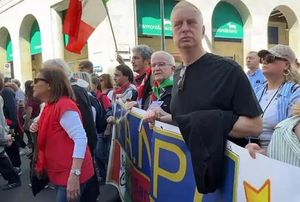The spotlight was firmly on Wisconsin as the Republican National Convention (RNC) unfolded in Milwaukee, providing a rich backdrop for political maneuvers, media skirmishes, and a notable rise in users on the popular gay dating app Grindr. Throughout this eventful week, several threads emerged that showcased not only the inner workings of party politics but also offered a glimpse into the intersection of technology and social dynamics.
As convention activities kicked off, reports surfaced indicating widespread connectivity issues with Grindr, reflecting a surge of users at the event. Downdetector, a site monitoring service availability, reported over 1,000 outage complaints in the Milwaukee region on Tuesday afternoon. While users outside Wisconsin also experienced difficulties, including in major cities like Chicago and Los Angeles, Grindr's official status updates insisted that no outages had occurred since May, making the moment unique.
A local Grindr user remarked to the Milwaukee Journal Sentinel about the probable influx of anonymous profiles, stating, "On any given day, you'll go on there and see a headless torso or blank profile." However, during convention time, he noted over 50 such profiles, suggesting perhaps that many attendees were looking for fleeting connections rather than meaningful encounters. This situation led to a lively discussion on social media platforms, where even ex-Congressman George Santos chimed in, labeling the RNC a "Grindr Superbowl," urging closeted individuals to embrace their identities, hinting at the tensions between conservative values and personal truths.
Meanwhile, in a captivating contrast, Senator JD Vance's interview on Fox News had drawn double the viewers that President Joe Biden's interview on NBC News achieved during the same time slot. Vance's appearance, a highlight of his first major media foray following his nomination as Trump’s running mate, captivated an audience around 6.1 million strong—significantly overshadowing Biden's 3 million viewership.
Senator Vance utilized the platform to communicate his vision, while Biden took the opportunity to address the tragic events surrounding a suspected assassination attempt on a Trump supporter at a rally. Biden sought to mitigate rising concerns tied to both violence and his age by spotlighting his campaign activities, claiming he was substantively active and engaged in American life. The meeting of these two narratives—the rising Republican star opposing a seated president—illustrated a pivotal moment, reflective of a nation divided and charged with palpable political energy.
In tandem with these media blitzes, Lara Trump, co-chair of the Republican National Committee, reacted to Vice President Kamala Harris’s eye-popping fundraising success. Harris, who recently transitioned to the forefront of the 2024 race following Biden's withdrawal, celebrated a record-breaking $81 million collected within 24 hours of announcing her candidacy. This windfall illustrated a significant shift in political dynamics, particularly following calls for Biden to step aside.
Lara Trump acknowledged the heft of Harris's fundraising but dismissed it as primarily supported by wealthier constituents looking to ensure Trump's defeat. This reaction lends credence to the ongoing debate over the influence of monetary contributions in political campaigns and emphasizes differing perceptions of legitimate support.
Adding to the week’s events was an extensive dialogue on social media emanating from U.S. Secretary of Transportation Pete Buttigieg’s interview with Fox News, where he adeptly navigated questions surrounding immigration and crime. Buttigieg presented data to counter what he described as the Republican narrative that immigration was directly contributing to crime spikes, refocusing the discussion on factual crime trends rather than anecdotal narratives.
Buttigieg pointedly noted that crime statistics actually improved under Biden's administration, a counterpoint that highlighted the ongoing struggle between incumbent narratives and oppositional rhetoric during this election cycle. His performance on the show was widely lauded across social media channels, being called a "master class" in political communications.
Wisconsin's RNC this week illustrated the multifaceted world of modern politics; the confluence of technology with social culture was exemplified through Grindr's activity, while traditional media struggles underscored the significant divides within the electorate. As candidates prepare for the upcoming election season, the landscape is increasingly influenced by emergent technologies and savvy media strategies that shape public perception, engagement, and ultimately, the course of the electoral process.
The intertwining of deeply personal encounters facilitated by apps like Grindr against the dramatic political grappling at the convention showcases a nation at a crossroads, nestled within excitement—but also, the uncertainty that accompanies profound political change.
Grindr, a platform that once served primarily as a means for connection amongst the LGBTQ+ community, mirrored the underlying themes of vulnerability and identity exploration present in the broader Republican strategies during the RNC. As individuals flocked to both the convention and apps for connection, this week underscored the undeniable connections forged in both the virtual and political arenas.



